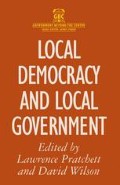Abstract
Concern about quangos is not new but has again become a much publicised theme within contemporary debates on the nature of government. Whilst national and regional bodies such as the Housing Corporation and the various funding councils for education have a significant impact on the governance of localities, the focus of this chapter is on those local quangos which have proliferated in recent years and which now deliver a considerable portion of the policies, programmes and services which affect people’s everyday lives. Specifically the approach is to survey eleven kinds of nonelected public body (despite the terminological confusion hereafter referred to as quangos) which operate at the local level in the health, education, housing, training and urban development sectors: District Health Authorities (DHAs), Family Health Services Authorities (FHSAs), and NHS hospital trusts; Higher Education Corporations, Further Education Corporations, grant maintained schools, and City Technology Colleges (CTCs); Housing Action Trusts (HATs) and housing associations; Urban Development Corporations (UDCs), and Training and Enterprise Councils (TECs). The central contextual factor is that there are well over 4800 local quangos with a total budget of over £37 billion, that is almost two-thirds of the equivalent allocation of central government money to local government. Equally important, the ‘new local magistracy’ in England and Wales numbers well in excess of 50 000 compared with under 23 000 elected local councillors.1
Preview
Unable to display preview. Download preview PDF.
Notes and references
Weir, S. and Hall, W. (1994) Ego Trip: Extra-Governmental Organisations in the UK and their Accountability Democratic Audit, University of Essex & Charter 88 Trust, pp. 8–10.
Stewart, J. (1992) Accountability to the Public European Policy Forum.
Day, P. and Klein, R. (1987) Accountabilities, London: Tavistock Publications.
Ashburner, L. and Cairncross, L. (1993) ‘Membership of the “New Style” Health Authorities: Continuity or Change?’, Public Administration, vol. 71, pp. 357–75.
Humble, S. (1982) Voluntary Action in the 1980’s Berkhamstead: The Volunteer Centre;
Kearns A (1991) Active Citizenship and Accountability: The case of the British Housing Association Movement, University of Glasgow: Housing Associations Research Unit: Discussion Paper 2.
West, M. and Sheaff, R. (1994) ‘Back to Basics’, Health Service Journal, 24 February.
Halpin, D., Power, S. and Fitz, J. (1993) ‘Opting into State Control? Headteachers and the Paradoxes of Grant-Maintained Status’, International Studies in the Sociology of Education, vol. 3, no. 1, p. 14.
Davis, H. and Stewart, J. (1994) The Growth of Government by Appointment: Implications for Local Democracy, Luton: Local Government Management Board, p. 8.
Ferlie, E., Ashburner, L. and Fitzgerald, L. (1993) ‘Board Teams — Roles and Relationships’, Research in Action Paper 10, Bristol: NHS Training Directorate.
Graystone, J. (1992) ‘Relations with Governors, Academic Boards and the LEA’, in Turner, C. (ed.) Guide to College Management, London: Longman.
Robertson, D. (1993) ‘Establishing Strategic Direction in Higher Education Institutions’, Public Money and Management, vol. 13, no. 3, pp. 45–51.
Bush, T., Coleman, M. and Glover, D. (1993) Managing Autonomous Schools, London: Paul Chapman, p. 173;
Bush, T., Coleman, M. and Glover, D. (1993) ‘Researching Autonomous Schools: A Survey of the First 100 GM Schools’, Educational Research, vol. 35, no. 2, p. 121.
Bennett, R. J., Wicks, P. J. and McCoshan, A (1994) Local Empowerment and Business Services: Britain’s Experiment with Training and Enterprise Councils, London: UCL Press, pp. 76–80.
Evans, B. (1992) The Politics of the Training Market: From Manpower Services Commission to Training and Enterprise Councils, London: Routledge, p. 121.
Clarke, M. and Stewart, J. (1994) ‘The Local Authority and the New Community Governance’, Regional Studies, vol. 28, no. 2, pp. 201–7.
Editor information
Editors and Affiliations
Copyright information
© 1996 CLD Ltd
About this chapter
Cite this chapter
Greer, A., Hoggett, P. (1996). Quangos and Local Governance. In: Pratchett, L., Wilson, D. (eds) Local Democracy and Local Government. Government Beyond the Centre. Palgrave, London. https://doi.org/10.1007/978-1-349-25022-6_8
Download citation
DOI: https://doi.org/10.1007/978-1-349-25022-6_8
Publisher Name: Palgrave, London
Print ISBN: 978-0-333-66433-9
Online ISBN: 978-1-349-25022-6
eBook Packages: Palgrave Political & Intern. Studies CollectionPolitical Science and International Studies (R0)

